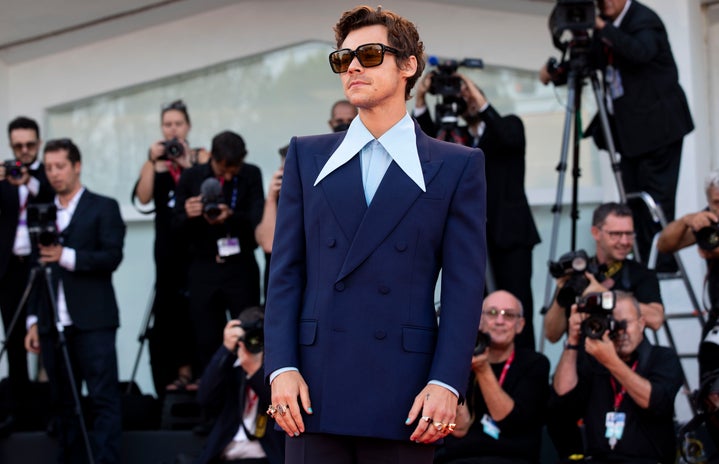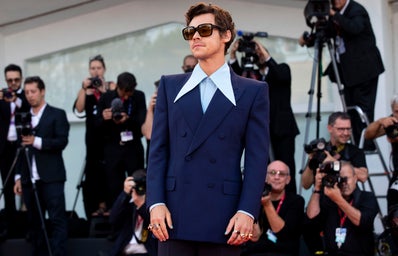Retrieved from Mypolicemanmovie.com
When I first learned about Harry Styles being cast to play the role of a gay man in the 1950’s, I almost couldn’t believe it. Well, to be fair, I never would’ve imagined him as an actor at all. I’m sure most people know about his role in Don’t Worry Darlingー after all, how could you not with all the juicy drama surrounding it?! But for me, it was upsetting when I realized that, compared to that movie, not a lot of people knew about My Policeman; his other movie which was released almost a month later in selected theaters. Of course, I watched them both, and I can confidently say that his performance in My Policeman was better. Consequently, it was my favorite movie out of the two. However, there are more reasons why I enjoyed this movie more than the other one. Let’s start this review, shall we?
When I saw the trailer of My Policeman, I thought it was going to be just like any other tragic movie about two gay men. But then, when I finally watched it, I realized it was more than that. This film, based on a 2012 novel by Bethan Roberts, follows the story of Tom, a policeman that marries Marion, a teacher. However, he falls in love with Patrick, an art curator with whom he has an affair. It’s set in the 1950s UK where being homosexual was illegal, so in order to have a same-sex relationship, you had to hide it or you would get arrested, facing up to ten years in prison.
“These are wretched times we live in. When one has to scurry underground like a criminal… just to drown one’s sorrows.” – Patrick
I expected a linear narrative: Tom and Marion dating, then getting married, then Tom and Patrick having an affair. However, this film starts almost at the end, which simultaneously caught me off guard and grabbed my attention immediately. I think choosing to start a movie with the three of them as elderly people filled with regret in their eyes and bodiesーwith so much history that we, as viewers, are unaware ofー elevated the story. Within the first few minutes of the movie, you could grasp the sense of nostalgia that every character had. This sentimentality was emphasized with the film’s visuals and colors, the score, and its characters. I have to give kudos to the director, Michael Grandage, for choosing the perfect cast. Not only did he have to cast the younger versions of the characters, but also the 1990s version. In an interview with the Academy, Grandage says “I was very aware that we were dealing with three time frames anyway. You always watch the film in your own time frame; so, 2022 plays a part in this. Somehow, there’s a kind of weird time machine thing going on as you take into account the societal changes that have happened right up until the present.” Grandege’s reasoning stood out to me because, when you’re watching this movie, you inevitably have the 2022 perspective, but you also need to analyze it from the 1990s and 1950s perspective, where things were completely different. This was one of the reasons why I loved this movie so much.
Another thing that made this film so interesting to me was that, if you didn’t know what this movie was about, for the first third of the story, you would’ve thought that Patrick was actually in love with Marion and that the affair was going to be between the two of them instead of Tom and Patrick. It felt like there were so many foreshadowing scenes between the two of them that it wouldn’t make sense for Tom and Marion to be together, or even Tom and Patrick. There wasn’t a clear pair of the love triangle, because it felt like everyone could have feelings for everyone as if the director was teasing the viewers. When I thought about this, I came to the conclusion that, at first, Tom had no personality whatsoever. He was your average policeman with a sort of innocence in him, but nothing remarkable enough to make two people like Marion and Patrick fall in love with him. Grandage described his character as a policeman in a society where it’s illegal to be gay, who keeps everything close to his chest. “He’s almost going to be monosyllabic. He’s going to be shy.”
And yet, when the truth was finally shown to the viewers, I was in awe. When we got to see the real Tom and how passionate he was for the one he truly loved, it was almost as if I was watching two different characters. The passion between Tom and Patrick could be felt in that theater. Their romantic scenes felt so genuine and raw, as if their emotions were spilling out of their bodies. Their love was, just as Patrick described it, all-consuming. Patrick became my favorite character. He was a man that had seen far too much, that had gone through horrible things, but remained just as hopeful and full of love. I felt so sorry for him throughout the movie because he was the character that had the most love to give, sacrificing himself just to receive so little in return.
“This love is all-consuming. I pity people who don’t know what it feels like to be this in love.” – Patrick
What is this movie really about? In numerous interviews, Harry Styles said that this story was tragic because it was about wasted time, and time is the one thing we can’t control or have back. Having that in mind, I think this movie was about love, regret, and wasted time. When I finished the movie, I wrote in my notes this simple guide to help me write this article: “Marion – selfish love; Tom – desperate love; Patrick – selfless love.” As a self-certified lover, my favorite thing about this film was the portrayal of love as a catalyst for every single action of the characters. Marion wasted years of her life holding on to a made-up version of her husband. Tom wasted years of his life faking who he was because he wasn’t brave enough. Patrick wasted years of his life giving so much of himself without expecting anything back.
Retrieved from IMDb
It will always be a mystery to me why this film wasn’t promoted as much as the other one. But if you have the opportunity to watch My Policeman, you won’t regret it. The message of this movie is just as important right now as it was back then. The LGTBQ+ community has the same right to love whoever they want as freely as straight people do without having to fear for their lives. While this film was set in the 1950s, there are still countries where homosexuality is considered illegal. Movies like this help us understand that there are stories different from ours, and we, as a society, can do better. This article is an appreciation letter for the director and the actors. Thank you for the representation.


